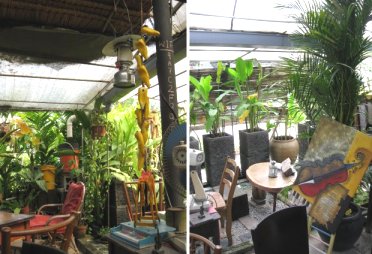Now, we have the Internet, which not only informs us when an empire falls but can potentially facilitate the fall of empires. Misinformation, conquest, and war and all its inhumanities, however, are still with us.
Clash of civilisations
The shockwaves of Christopher Columbus's voyages of exploration and discovery five centuries ago still reverberate todayfirst published in The Star, 17 February 2012
The Christopher Columbus I read about in school was the famous explorer and navigator who discovered America. His image then was viewed through rose-tinted lens, his exploits written and spoken of in admiring tones.

Apart from the life story of Christopher Columbus, or Cristóbal Colón as he was known in Spain, the author also shows us what it was like in Genoa and Europe back then, thus providing historical context for everything else that followed: Columbus's voyages and the subsequent colonisation of the New World and the subjugation of its native populations. Bergreen also notes that other Genoans before Columbus tried – and failed – to sail across the Atlantic. And the reaction from those who heard about his research: "You mean he made four voyages?" Yes, he did.
The Genoan's idea to cross the Atlantic and arrive in the East was, from Bergreen's writings, a badly informed venture based on mostly unreliable accounts by the likes of Marco Polo and the polymath Ptolemy (c. 90–c. 168CE). By Columbus's time, the rule of the "Grand Khans" in China was long over and the Mongol empire lay in ruins. But he didn't know that.

They even added an image of the explorer, allegedly painted
by Venetian artist Sebastiano del Piombo (1485–1547). No
paintings of Columbus were made when he was alive, and no
one is sure if the guy here is ol' Chris. If he hadn't been
away most of the time...
by Venetian artist Sebastiano del Piombo (1485–1547). No
paintings of Columbus were made when he was alive, and no
one is sure if the guy here is ol' Chris. If he hadn't been
away most of the time...
Of course, the undertaking needed lots of resources. Failing to sell his idea to the king of Portugal, Columbus turned to the Spanish monarchs. His proposal, in short, was: Give me men, ships, and stuff, and a nice shiny title, and I'll bring back spices, gold and all manner of riches – and convert a few locals to Christianity. The self-styled "bearer of Christ" believed his was a holy enterprise. That belief was strengthened by the safe crossing of the Atlantic on his first voyage, and a few other strokes of luck in subsequent journeys to "the East".
But his luck and supposed divine protection was not foolproof. Though a masterful mariner and expert on the water, Columbus was rather clumsy on land and in politics. Many of the men who came with him to the New World on subsequent voyages behaved badly, to say the least. Columbus himself was accused of using torture to keep the peace and force the natives to bring him gold. News of his alleged mismanagement of the New World settlements reached Spain, and at the end of his third voyage, he was sent back in chains and stripped of his authority. After returning from his disastrous fourth and final voyage, he died in 1506, a physical and emotional wreck.
Bergreen has done a good job researching and writing Columbus. The facts practically turn the pages for the reader, though one could argue that it could also be the morbid fascination with people's bad behaviour. Even some of the "noble savages" exhibit varying degrees of political cunning, using their ties with the explorers to their advantage.
As for Columbus himself, sadly, I came away with an impression that he was a self-serving, delusional jerk with gold fever, who was not averse to the idea of enslaving the natives, even those who had been kind to him and his countrymen. The author uses several forms of the word "delusion" a few times.
Though Columbus may not have been the first to reach the Americas, he did make it public, triggering the massive and continuous influx of people to the Americas. A partial result of that is the world-shaping superpower that is today's United States. His name has been given to many roads, buildings, vessels, geographical features, and towns in that country. The native populations there, however, would probably have other opinions.
Bergreen's Four Voyages shouldn't be seen simply as an indictment of his subject's failures – as a governor or explorer of the East – but also a historical account of the consequences of empire, and how lofty goals and high moral grounds can never fully justify the damage done to the colonised in the name of religion, wealth and nation.
Even so, Columbus shouldn't be harshly judged for the times his conduct was less than exemplary. His fate depended on the successes he promised he would achieve upon crossing the Atlantic. If he didn't make it, well, who can say that a world unmarked by his voyages would be any better?
18/10/2014 About a week after this review was published, someone wrote to The Star in response to it. The paper published my reply not long after.
Another issue I felt I haven't explored was the 'true image' of Columbus in comparison with one Bartolomé de las Casas. But I think I'll let The Oatmeal handle that.
Columbus
The Four VoyagesLaurence Bergreen
Viking (2011)
417 pages
Non-fiction
ISBN: 978-0-670-02301-1
Categories:
Book Reviews,
The Star





















